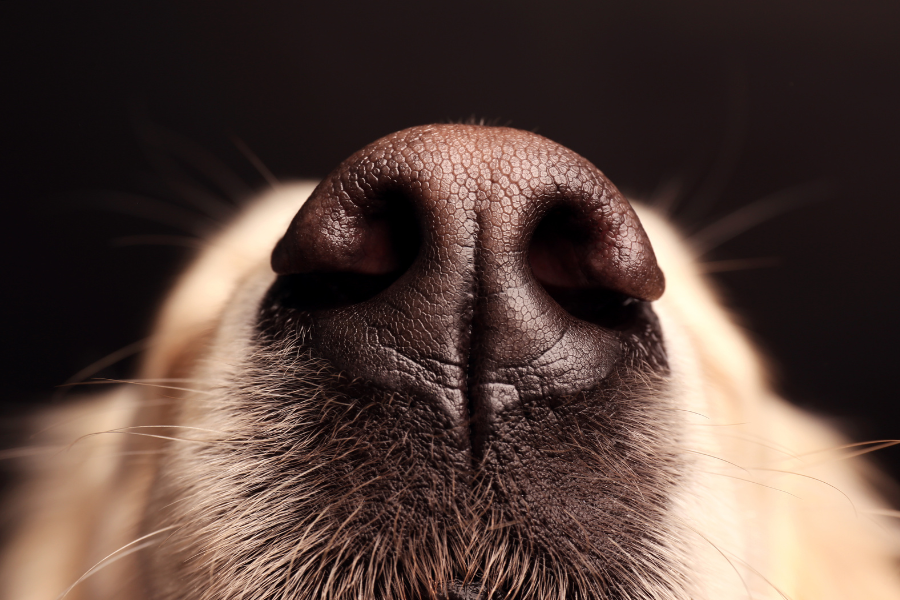What's up Mesa dog fam? Today we are talking about dog allergies - yes, they are a thing! And quite a common thing at that. Dog allergies can be a real pain (or should we say itch) for you and your pup. If you have a dog that is constantly scratching, biting, sneezing, or having digestive issues, you may have a dog who is dealing with allergies. While we always recommend consulting your vet if you suspect that is the case, there are quite a few natural remedies for dog allergies that can be game changers (we are speaking from experience here!)
What Exactly Are Dog Allergies?
Humans and pets have more in common than you think. One commonality is allergic responses. Many of the same things humans are allergic to, like dust, pollen, grass, or foods, are things dogs can also have an allergic reaction to. And an allergic reaction in a dog, can manifest similarly to how it does in a human, stemming from immune system overreactions, like itching, skin redness, pain or discomfort.
Why Should You Go Natural, Anyway?
Good question! And we should start by saying that going natural is not for everyone. But for many pups and humans, medications either do not help, or may cause some unwanted side effects. The latter (fewer side effects) is a common reason for those to seek natural remedies for both themselves and their pets. At home remedies are typically easy, inexpensive, and they can be quite effective!
Common Symptoms of Dog Allergies
Knowing the symptoms can help you determine if your dog indeed has allergies. Here are some common signs:
- Excessive scratching or licking
- Red or inflamed skin
- Sneezing or coughing
- Watery eyes
- Ear infections
- Digestive issues like diarrhea or vomiting
Now that you're armed with this knowledge, let's move on to the fun part—natural remedies!
1. Oatmeal Baths
Oatmeal isn't just for breakfast, people! It's also a fantastic natural remedy for itchy skin. The anti-inflammatory properties can soothe your dog's skin and provide instant relief.
How to Do It:
- Grind plain oatmeal into a fine powder.
- Mix the oatmeal powder into warm (not hot) water.
- Bathe your dog in this mixture for about 10-15 minutes.
- Rinse thoroughly and pat dry.
You can also check out our more in-depth guide to make an oatmeal bath for your dog.
2. Apple Cider Vinegar Spray
Apple cider vinegar (ACV) is a versatile household staple that's great for alleviating itchy skin and repelling fleas.
How to Do It:
- Mix equal parts ACV and water in a spray bottle.
- Spray the solution on your dog's coat, avoiding the face and any open wounds.
- Allow it to air dry.
3. Coconut Oil
Coconut oil is a miracle worker for both humans and dogs. It's packed with antibacterial and antifungal properties, making it perfect for treating allergies.
How to Use It:
- Apply a small amount of coconut oil directly to the affected areas.
- You can also add a teaspoon of coconut oil to your dog's food to boost their immune system from the inside out.
4. Quercetin Supplements
Quercetin is a natural antioxidant found in many fruits and vegetables. Known as "nature's Benadryl," it can help reduce histamine release and alleviate allergy symptoms.
How to Use It:
- Consult your vet for the appropriate dosage based on your dog's weight.
- Quercetin supplements can usually be found at health food stores or online.
5. Herbal Teas
Certain herbal teas can be used as a rinse to soothe itchy skin. Chamomile and green tea are particularly effective.
How to Do It:
- Brew a strong tea using chamomile or green tea.
- Allow it to cool down completely.
- Pour the cooled tea over your dog during their bath as a final rinse.
6. Fish Oil
Fish oil supplements are rich in omega-3 fatty acids, which can reduce inflammation and promote healthy skin and coat.
How to Use It:
- Add fish oil capsules to your dog's diet.
- Again, consult your vet for the proper dosage.
7. Aloe Vera
Aloe vera is not just for sunburns! It's great for soothing irritated skin and providing relief from itching.
How to Use It:
- Use pure aloe vera gel (avoid products with added chemicals).
- Apply the gel directly to the affected areas.
8. Probiotics
A healthy gut can mean a healthy dog. Probiotics help maintain a balanced digestive system, which can improve your dog's overall allergy resistance.
How to Use It:
- Look for high-quality probiotic supplements designed for dogs.
- Add them to your dog's food as directed.
9. Diet Modification
Sometimes, the root cause of your dog's allergies could be their diet. Common food allergens include beef, chicken, dairy, and wheat.
How to Do It:
- Work with your vet to identify potential food allergens.
- Switch to a hypoallergenic or limited ingredient diet.
- Monitor your dog's symptoms over a few weeks to see if there's an improvement.
More About Making Diet Modifications For Your Pup
So although is may sound like an easy thing to do, making diet modifications can be challenging for many, especially for those of you who have dogs with a sensitive belly! Food allergies or sensitivities are all to common causes of digestive and skin issues, but identifying the offenders can be the difficult part. Here is how we recommend going about it (again, speaking from experience here!):
Work with Your Vet:
Here is to hoping you have a vet you like, because collaborating with them and guidance from them can be key to success.
Monitor Closely:
Key number two for success is to monitor your dog closely, and take notes! Literally, keeping a journal (or just jotting down notes in your phone every day - if you make any diet changes, and if you notice any new symptoms, or less symptoms). Typically it can take a bit of time (sometimes 2-3 months) for significant changes or improvements to occur, so be patient.
Start Small and Go Slow(ly):
As you should do with any new food or supplement, introduce it slowly and only a little bit at a time. A dog's stomach can be even more sensitive to dietary changes than a human's is, so start by mixing in a small amount of the new food with the food they have been eating, and gradually increase the amount you mix in over the a 1-2 week period, monitoring closely for any changes or worsening of symptoms.
Avoid Treats and Table Scraps:
While you're in the trial phase, it's important to avoid giving your dog any treats or table scraps that could contain potential allergens. Stick strictly to the new diet to ensure accurate results.
Reintroduce Carefully:
If your dog's symptoms improve, you might try reintroducing old foods one at a time to identify the specific allergen. This should be done under the supervision of your vet to ensure your dog's health and safety.
By making thoughtful adjustments to your dog's diet and closely monitoring their reactions, you can make significant strides in managing their allergies. Remember, every dog is different, so what works for one might not work for another—patience and persistence are key.
Conclusion
Dealing with dog allergies can be challenging, but natural remedies offer a safe and effective way to provide relief. From oatmeal baths to diet modifications, there are plenty of options to explore. Always consult your vet before starting any new treatment to ensure it's safe for your furry friend.
Ready to take the next step in caring for your dog? Join our community of dedicated pet parents for more tips and exclusive deals on natural pet care products. Together, we can make life a little less itchy and a lot more enjoyable for our beloved pets.
If you have any questions or need further guidance, feel free to reach out. We’re here to help!
Happy pet parenting!
FAQ
How do I know if my dog has allergies?
If you see your pup licking, biting or scratching excessively (excessively is the key word here), this could be a dead giveaway that they have allergies. GI (gastrointestinal) issues, like diarrhea, vomiting or constipation are also common allergy symptoms.
Can I use these natural remedies alongside prescribed medication?
The short answer here is yes, most of the remedies listed above are absolutely OK to use with other conventional treatments. It is always a bright idea to chat with your vet about combining natural remedies with medications.
Are these remedies safe for puppies?
Most of the remedies mentioned are safe for dogs of all ages, but again - if you have any questions or concerns, consult your vet first!
Can I use human antihistamines for my dog?
Sometimes, but DO NOT do this without your vet's oversight. Dosage is key, as human and pet dosing is drastically different.
What if my dog's symptoms don't improve?
Maybe you have tried some or all of the remedies on this list, and nothing has improved. This is a possibility. If that happens, you should 100% consult your vet. They may want to do a more comprehensive work up and test for other issues that could be causing your dog's symptoms.
How can I prevent future allergy flare-ups?
Say you have gotten a handle on their allergies (whoop whoop!), and you want to do all you can to prevent any future flare-ups. It is essential you just continue doing a combination of the things you have been doing that helped! This could be; having them eat a balanced diet, keeping their living environment clean (especially where they relax and snooze), and checking in regularly with your vet.
References
1) Chan SK, Leung DYM. Dog and Cat Allergies: Current State of Diagnostic Approaches and Challenges. Allergy Asthma Immunol Res. 2018 Mar;10(2):97-105. doi: 10.4168/aair.2018.10.2.97. PMID: 29411550; PMCID: PMC5809771.



